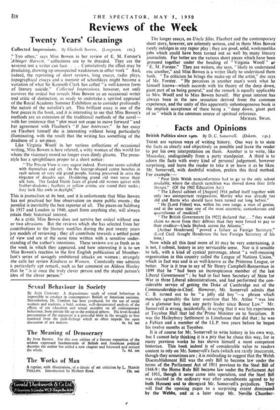Reviews of the Week
Twenty Years' Gleanings
Collected Impressions. By Elizabeth Bowen. (Longmans. 6s.) ." Too often," says Miss Bowen in her review of E. M. Forster's Wbinger Harvest, " collections are to be dreaded. They are the severest test a writer can face. . . . Cumulatively the effect may be desolating, showing up unsuspected weaknesses in other work " And, indeed, the reprinting of short reviews, long essays, radio plays, topographical essays and a memoir of schooldays might become a variation of what Sir Kenneth Clark has called " a well-known form of literary suicide." Collected Impressions, however, not only survives the ordeal but reveals Miss Bowen as an occasional writer and critic of distinction, as ready to undertake a spirited appraisal of the Royal Academy Summer Exhibition as to consider profoundly the nature of the novelist's art. This brilliant essay is one of the best pieces in the book, and it is interesting to see that Miss Bowen's methods are an extension of the traditional methods of the novel— with her insistence that " plot must not cease to move forward " and her agreement with Flaubert's "II faut Nteresser." In her essay on Flaubert himself she is interesting without being particularly illuminating, with the result that the writing has something of the deadness of a set-piece.
Like Virginia Woolf in. her various collections of occasional writing, Miss Bowen is here relaxed, a witty woman of this world for whom the visionary sword no longer even dimly gleams. The prose- style has a sprightliness proper to a short notice:
"The Private View is very august indeed. Everyone seems satisfied with themselves and art. On the lozenge-shaped centre benches in each saloon sit very old grand people, having preserved in orris the elegance of decades ago. Doddering grand old men nurse their silk hats. The farded bluish faces of grand old women quiver with feather-shadows ; feathers or yellow ermine are round their necks ; they look like owls in daylight."
This is journalism at its best, and it is unfortunate that Miss Bowen has not practised her fine observation on more public events ; the novelist is inevitably the best reporter of all. The pieces on Salzburg in 1937 and London in 1940, apart from anything else, will always retain their historical interest.
As a critic Miss Bowen does not survive her ordeal without one or two abrasions. But the reviews which she has selected from her contributions to the literary weeklies during the past twenty years pre models of reviewing ; they all contribute towards a settled point of view and are at the same time written with a sensitive under- standing of the author's intentions. These reviews are as fresh as in the week in which they appeared, and how interesting it is to see Miss Bowen's reaction to the first English publication of Monther- lant's series of savagely embittered attacks on women ; strangely she calls her review Kindness to Women. Constantly one admires a particularly apt remark, such as her comment on Aldous Huxley that he " is at once the truly clever person and the stupid person's idea of the clever person." The longer essays, on Uncle Silas, Flaubert and the contemporary short story, however, are solemnly serious, and in them Miss Bowen rarely indulges in any rapier play ; they are good, solid, workmanlike jobs which could have been turned out as well by many literary journalists. Far better are the various short pieces which. have been grouped together under the heading of " Virginia Woolf " or " E. M. Forster." They are writers, she says, " likely to understand one another," and Miss Bowen is a writer likely to understand them both. " To criticism he brings the make-up of the artist," she says of Mr. Forster. " He perceives in another man's work what he himself knows—which accords with his theory of the deep down, giant part of us being general," and the remark is equally applicable to Mrs. Woolf and to Miss Bowen herself. Her great interest has always been in the new, sensation derived from the common experience, and the unity oethis apparently unhomogeneous book is the implicit acceptance of there being a " deep down, giant part of us " which is the common source of spiritual reference.
MICHAEL SWAN.






































 Previous page
Previous page